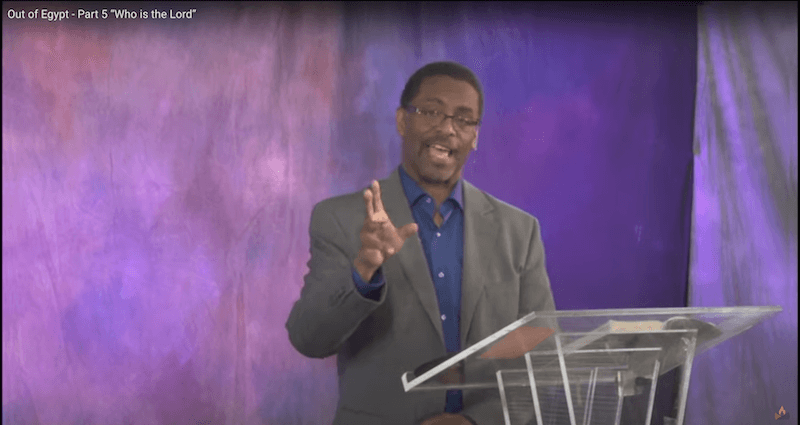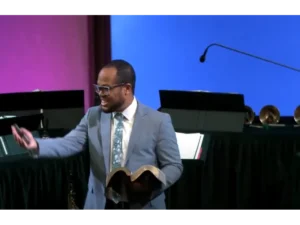We follow Moses from the burning bush to Egypt where Moses and Aaron had their first encounters with the Hebrew elders (Exodus 4:29-31) and Pharaoh (Ex. 5:1). The elders worshipped, but Pharaoh scoffed. “Pharaoh said, ‘Who is the LORD, that I should obey him and let Israel go? I do not know the LORD and I will not let Israel go.’” (5:2)
Pharaoh did not know Yahweh—this God of slaves—and refused to obey Him. As punishment for such an audacious demand, Pharaoh stopped supplying straw for the bricks the slaves had to make. (See Ex. 5:5-8.) With the straw supplied by Pharaoh the tally of bricks was between 2,000 and 2,500 bricks per day per slave. It was difficult, but manageable. But now the Israelites must find their own straw. Verse 12 says, “So the people scattered all over Egypt to gather stubble to use for straw. The slave drivers kept pressing them…” They were close at hand making them hurry.
And just like the Egyptians forced the Israelites themselves to become part of the enforcement of their own slavery, we allow the enemy to make us the enforcers of our own slavery! [Now we are in a hurry to get back to our hurried, pre-Covid, lives!]
“Make the work harder for the men so that they keep working and pay no attention to lies” (vs. 9). What Pharaoh called “lies” was truth. It’s not the first time or the last that the truth is called a lie and a lie is called the truth. And when life is faster, and work is harder it’s hard to know which is which. More and more of the things of this world generally result in less and less of the things of God. Satan’s strategy, like Pharaoh’s is, “Keep them busy so they can’t pay attention to the word of God.” Even in a pandemic, we manage to pay attention to anything but the word of God.
Pharaoh always contradicts God. God says one thing, satan says another. Our slavery to or freedom from sin depends on who we listen to. But sometimes even when we listen to God, things go from bad to worse. [Rewind to 5:20-23] When things go from bad to worse, who is the Lord? He’s still the ruler and sovereign over all. He’s still in control. All His promises are Yes and Amen, and He will do what He said.
So what does Moses do? “Moses returned to the Lord…” (vs. 22). That’s where all true recovery starts. Even in this second failure, Moses shows growth. When he failed the first time, he ran away (1:15), this time he ran back—back to the Lord. When you fail, bring your failure to the Lord.
Moses returned to the Lord (5:22), and the Lord said Now… (6:1). The hinge of the whole Exodus enterprise swings on the NOW of 6:1. It is a ‘turn your eyes upon Jesus moment, for transformation comes through seeing the LORD as He is past, present, and future.
Moses asked, “Why, Lord?” And God only answered, “I am the Lord.” Our “whys” can never outweigh God’s “I AM.” And now, not to Abraham, not to Isaac, and not to Jacob, who only knew Him as El Shaddai (God Almighty), but NOW to Moses, Aaron, the Hebrews, the Egyptians and to Pharaoh, He reveals what He will be and do in seven stunning promises. [Rewind to 6:6-8]
- I will bring you out from under the yoke of the Egyptians.
- I will free you from being slaves to them.
- I will redeem you with an outstretched arm and with mighty acts of judgment.
- I will take you as My own people.
- I will be your God
- I will bring you to the land I swore with uplifted hand to give to Abraham, to Isaac, and to Jacob.
- I will give it to you as a possession.
And to make sure Moses didn’t miss the point, He declares His name, I am the Lord! at the beginning and the ending of these promises. Who is the Lord? He is the Alpha and the Omega, the beginning and the end. And He is in complete control of everything promised in between.
These seven promises of liberation match the seven references to hard labor in 5:6-21. Satan’s disdain and enslavement of humanity is complete (there is none righteous), but the deliverance of God through the man Christ Jesus is just as complete. Notice that these seven promises are a blueprint of the plan of salvation. (Compare with Mt. 11:28-30; Jn. 8:36; Isa. 59:1; Jn. 1:12; 20:17; Rev. 21:3; Jn. 14:1-3; Matt. 5:5.)
God takes all the initiative. A slave cannot deliver himself, but he can run when the door is opened. Jesus said “I am the door…” Run! And that’s why there is no other name under heaven given to men by which we must be saved” (Acts 4:12) No other god saves!
“Moses reported this to the Israelites, but they did not listen to him because of their discouragement and harsh labor.” (Ex. 6:9) Sometimes we can’t hear the message of the gospel because of discouragement over our present circumstances. Ever been there? We ask:
Who is the Lord, that I should obey Him when my expectations aren’t met?
Who is the Lord, that I should obey Him when my prayers go unanswered?
Who is the Lord, that I should obey Him when circumstances go from bad to worse?
The answer is the same. The LORD! His promises remain unchanged. The plan of redemption unaltered. You won’t really know the Lord until you can obey Him despite your discouragement.
Moses represents those at the end of time who also have learned who the Lord is. These are “those who obey God’s commandments and hold to the testimony of Jesus.” (Rev. 14:17) They speak only what God tells them to say and do just as the Lord commands them. And how did they learn to do this? By the blood of the Lamb and by the word of their testimony. And as the late Jere Patzer said, “There can be no testimony without a test.”
All faith is tested, and they are able to pass this final test at the end of time because they’ve learned to obey the Lord under all circumstances—when their expectations hadn’t been met, when their prayers seemingly went unanswered, when persecuted, when misunderstood, when tempted and when they failed. Instead of running away, they’ve learned to run to Jesus. Where are you running? Into or out of Egypt?
The question at the end will be, “Who is the Lord, that I should obey Him?” And before it is asked then under persecution, we had better be ready with an answer now under quarantine. In the great controversy, Jesus is not so interested in getting Satan to acknowledge him as Lord, but He desperately wants His own people to acknowledge Him as LORD with more than just their mouths.
If you’re disappointed with God because you’ve been doing everything right, but everything is still going wrong, do you know Him? If discouragement over your present circumstances is preventing you from hearing and accepting the gospel, do you know Him? If you’re asking “Why” this morning, hear God say, “I am the Lord.” It is in the context of your pain and struggle that you will know Him as Deliverer.
Pastor Randy Maxwell




